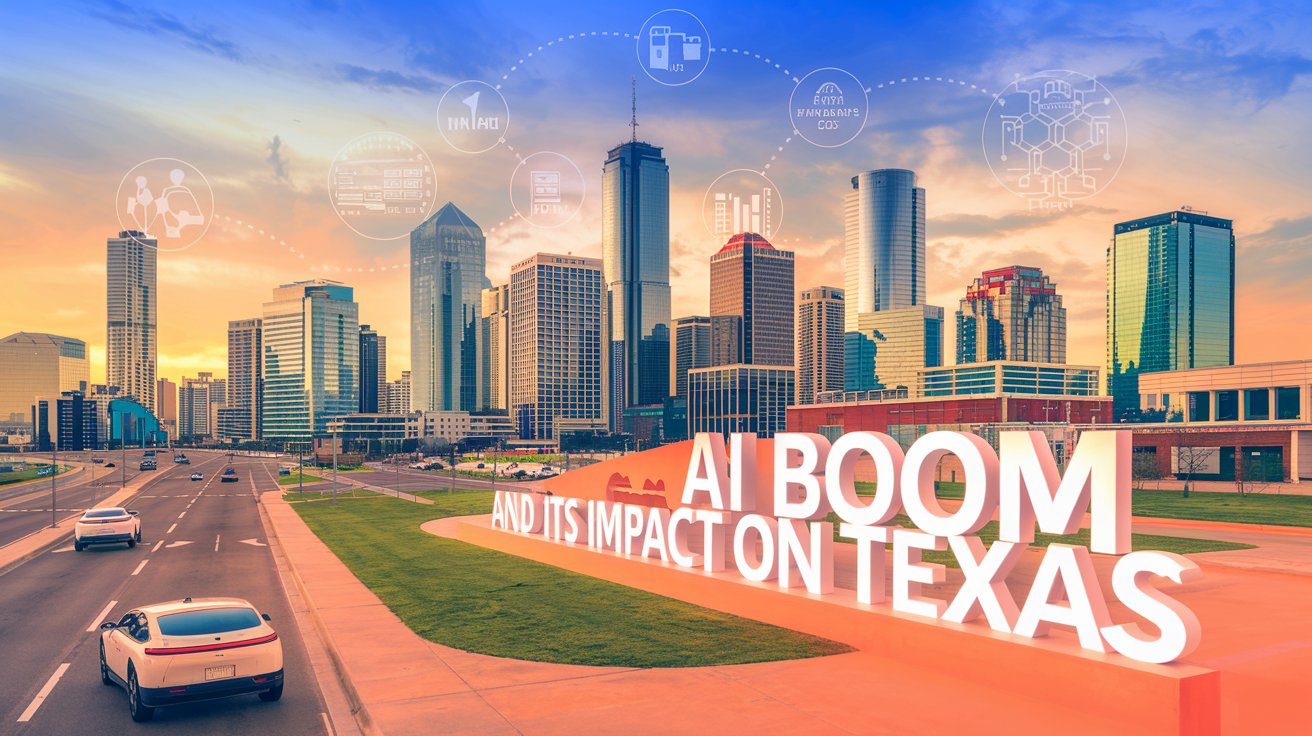AI Boom and Its Impact on Texas in 2025: A New Tech Frontier
The AI boom and its impact on Texas are reshaping the state’s economic and technological landscape, positioning it as a major hub for artificial intelligence innovation. As AI-powered industries expand, Texas is experiencing a surge in AI-driven data centers, increased property demand, job creation, and growing concerns over energy consumption.
Much like the Silicon Valley boom, which transformed California into a global tech hub, Texas is now witnessing a similar shift. AI investments from industry leaders such as OpenAI, SoftBank, and Oracle are driving the state’s transition into a powerhouse for high-performance computing, automation, and cloud infrastructure.
However, with rapid technological advancements come challenges: Will Texas be able to sustain this AI-driven growth? Can its energy infrastructure keep up with the demand? And what does this transformation mean for businesses, real estate investors, and job seekers? This article explores the impact of the AI revolution in Texas, its opportunities, challenges, and what the future holds.
The Rise of AI-Powered Data Centers in Texas
Artificial intelligence requires advanced computing infrastructure to function efficiently, and data centers are at the core of this transformation. AI models, such as ChatGPT, Gemini, and DALL·E, require massive amounts of processing power and storage. This has led to the construction of large-scale AI-powered data centers across Texas.
The Stargate Project: A $500 Billion AI Infrastructure Boom
One of the largest AI-driven projects in Texas is the Stargate initiative, a $500 billion investment to build 20 AI-powered data centers in Abilene, Texas. These data centers will support AI workloads, cloud computing, and automation technologies.
Texas is an ideal location for AI infrastructure due to:
✅ Affordable Land – Texas offers significantly lower property costs than Silicon Valley.
✅ Business-Friendly Environment – The state provides tax incentives and fewer regulations for tech companies.
✅ Abundant Energy Resources – Texas has a strong energy production industry, though sustainability remains a concern.
✅ Expanding Workforce – Universities and tech hubs in Austin, Dallas, and Houston are fueling AI talent.
As more tech giants set up AI research facilities in Texas, the AI boom is expected to create thousands of jobs, increase property values, and boost the local economy.
Texas: The New Silicon Valley for AI?
The Silicon Valley boom was driven by internet startups, software companies, and venture capital funding. However, Texas is now becoming the next epicenter of technological advancement, particularly in AI and cloud computing.
Key Differences Between Silicon Valley and Texas
| Factor | Silicon Valley Boom | Texas AI Boom |
|---|---|---|
| Industry Focus | Software, Social Media, Hardware | AI, Cloud Computing, Data Centers |
| Real Estate Prices | Extremely high | Lower, but rising |
| Business Taxes | High | Lower, attracting companies |
| Energy Dependence | Less focus on energy | AI needs vast amounts of power |
| Workforce | Competitive, expensive | Expanding, more affordable |
While Texas has a cost advantage, it must overcome energy consumption challenges and improve infrastructure to fully capitalize on its AI potential.
The Impact of AI Expansion on Texas Real Estate and Job Market
Much like the Silicon Valley boom, the AI boom and its impact on Texas are driving major shifts in real estate and employment.
Texas Real Estate Market: A Surge in Demand
As AI companies expand their operations, Texas cities like Abilene, Austin, and Dallas are seeing an increase in housing demand and property prices.
- Tech professionals are relocating to Texas, leading to a housing shortage in key cities.
- Real estate developers are investing in commercial and residential properties, mirroring the rapid growth seen in Silicon Valley.
- Businesses are moving to Texas to be closer to AI research centers and data hubs.
For real estate investors, the AI-driven economic boom presents opportunities in property development, rentals, and commercial leasing.
Job Market: AI Driving Employment Growth
The power of artificial intelligence to reshape industries is evident in Texas’s job market. AI expansion is creating new employment opportunities across multiple sectors:
✔ AI Research & Development – Engineers, machine learning experts, and data scientists are in high demand.
✔ Cybersecurity & IT – AI-driven businesses require security analysts and IT professionals.
✔ Construction & Infrastructure – Data center construction projects are fueling job growth.
✔ Energy & Utilities – AI-powered data centers require skilled workers in energy management.
However, automation may also replace some traditional jobs, requiring workers to adapt to new skill demands.
Challenges of the AI Boom: Energy Consumption & Sustainability
While the AI boom in Texas is creating economic opportunities, it also presents challenges, particularly in energy consumption.
The Power Demand Problem
AI-powered data centers require massive amounts of electricity to operate. The Electric Reliability Council of Texas (ERCOT) is already under pressure to meet energy demands, and AI expansion could strain the grid.
Potential Solutions
1️⃣ Modular Nuclear Reactors (SMRs) – Companies like Last Energy are exploring nuclear energy to power AI infrastructure.
2️⃣ Renewable Energy – Wind and solar projects could reduce dependency on fossil fuels.
3️⃣ Energy-Efficient AI – Companies are optimizing AI models to reduce power consumption.
Sustainability will be crucial in determining the long-term success of Texas as an AI hub.
Benefits & Downsides of the AI Boom in Texas
✔ Benefits
- Economic Growth – AI investments are boosting Texas’s economy.
- Job Creation – The demand for AI professionals is increasing.
- Innovation Hub – Texas is becoming a global leader in AI research.
- Infrastructure Improvements – Investments in roads, energy, and public services.
✖ Downsides
- Rising Cost of Living – Housing prices are increasing.
- Energy Strain – The power grid may struggle with AI energy demands.
- Competition – Smaller businesses may struggle to compete with tech giants.
- Environmental Concerns – Data centers contribute to carbon emissions.
Conclusion: Texas at the Forefront of AI Innovation
The AI boom and its impact on Texas are undeniable. The state is emerging as a leader in artificial intelligence, cloud computing, and automation, attracting major tech firms and investors.
However, challenges like energy consumption, infrastructure development, and workforce adaptation must be addressed for Texas to sustain its AI-driven growth. If the state successfully balances economic growth with sustainability, it has the potential to become the next global AI hub, much like Silicon Valley was for the internet era.
Texas is at the forefront of a technological revolution, proving that the power of artificial intelligence to reshape industries is real—and here to stay.
FAQs
1. Why is Texas becoming a hotspot for AI development?
Texas offers affordable land, business-friendly policies, and an expanding tech workforce, making it attractive for AI-powered industries.
2. How is the AI boom affecting Texas’s real estate market?
The AI industry is driving up property prices and increasing housing demand, particularly in Abilene, Austin, and Dallas.
3. What are the biggest challenges of AI expansion in Texas?
The main challenges include energy consumption, rising living costs, and infrastructure limitations.
4. Can Texas’s power grid handle AI expansion?
Energy consumption is a major concern, but solutions like modular nuclear reactors and renewable energy are being explored.












